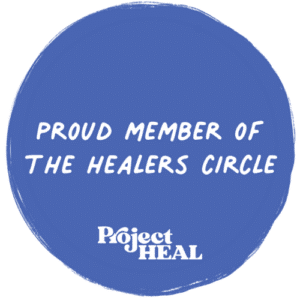We’ve all seen Hollywood’s depiction of stress eating—a glamorous young woman, fresh off a breakup, lying in her bed with a carton of ice cream, sobbing as she watches the same 90s rom-com for the third time that day.
Real-life stress eating does not feel glamorous. It often feels shameful, embarrassing, and out of control. For those who struggle with food, it’s a behavior that no amount of willpower can seem to curb.
Stress eating isn’t about the food. It’s often a signal of underlying emotional or psychological pain that isn’t being addressed directly.
What is stress eating?
Stress eating is the tendency to respond to difficult emotions by consuming significantly more food than usual. Often referred to as emotional eating, it usually involves eating when you aren’t hungry or continuing to eat even after you feel full.
Stress eating is very common; one study found that 38% of adults eat more hyperpalatable (e.g., high in sugar, fat, or salt) foods when they feel stressed.
People who have followed highly restrictive nutrition regimens throughout their lives are more likely to engage in stress eating.2 Calorie deficits, avoidance of certain foods, restrictive eating, and fasting can all increase the likelihood of stress eating when experiencing negative emotions.
What causes stress eating?
When a person experiences acute (short-term) stress, their nervous system releases hormones that trigger their fight-or-flight response. Acute stress is associated with a temporary decrease in appetite and food intake, as the body slows down certain functions and redirects its energy to survival3; think of our prehistoric ancestors defending themselves against bears or saber-toothed tigers in the wild.
Modern humans are much more likely to experience chronic stress, a long-term state of physical and psychological hyperdrive. Chronic stress can disrupt the hypothalamic-pituitary-adrenal (HPA) axis, resulting in consistently elevated levels of cortisol in the body. Over time, elevated cortisol can lead to spikes in appetite and an increased desire for hyperpalatable comfort foods.
Stressors that can trigger emotional eating:
- Financial hardship
- Relational tension
- Transitions, such as moving to a new school or having a baby
- Stressful work, school, or home environments
- Caregiving for children or parents
- Bullying or negative weight-centric comments from others
- Coping with underlying mental health conditions, such as anxiety or depression
Rigid food restriction is a risk factor for stress eating. Restrictive eating habits can make it hard to identify your own natural hunger cues and deplete nutrients your brain needs to cope with negative emotions and stress. Consistent food restriction can also make hyperpalatable foods more rewarding when you’re feeling stressed, reinforcing the brain’s association of certain foods with comfort, relaxation, or stress relief.3
Likewise, food can also serve as a distraction from emotions. Eating delicious foods can provide a momentary decrease in stress levels, but it doesn’t resolve the emotional strife at the root of a stress-eating episode.
The links between stress eating and eating disorders
People who struggle with stress eating may be at higher risk for developing binge eating and binge/purge eating disorders.5 At Aster Springs, we are here to help.
Eating can quickly become a primary coping mechanism for those who find emotional comfort or distraction in food. As stress eating increases in frequency and intensity, it can quickly morph into binge eating disorder (BED).
Some people who struggle with BED have difficulty coping with feelings of being overly full and out of control. This can lead to unhealthy behaviors like repetitive purging and, ultimately, can lead to the development of bulimia nervosa. Those suffering from BED or bulimia nervosa may have urges to eat in response to strong negative emotions but then grapple with immense shame, guilt, and anxiety in response to a stress-eating episode.
Negative emotions caused by stress eating and bingeing may contribute to lower mood, lower self-esteem, and increased depressive symptoms.
The differences between stress eating and binge eating disorder
Stress eating is not classified as an eating disorder but is rather a description of how people manage their feelings. Most people who occasionally stress eat don’t have an eating disorder. However, it’s important for individuals concerned about their eating habits to understand the differences between normal stress eating and disordered eating behaviors.
Emotional eating and BED can be differentiated by looking at the frequency of eating episodes and the impact those eating episodes have on one’s quality of life.
Stress eating may be a sign of an eating disorder if it results in any of the following:
- Feeling out of control around food
- Recurrent episodes of consuming large amounts of food when not physically hungry
- Eating food rapidly (faster than others who eat under similar circumstances)
- Hiding or sneaking food to eat alone (due to embarrassment)
- Feeling disgusted, ashamed, or generally distressed by one’s own eating patterns
- Compensating for stress eating episodes through self-induced vomiting, laxative use, medications, fasting, or excessive exercise
Many people who stress eat experience some of these aftereffects, but not at a level that causes consistent, intense distress in their lives. If your stress-eating episodes are getting more frequent, causing increasing levels of unhappiness, or leading to compensatory behaviors like purging or excessive exercise, it’s important to seek evaluation and treatment for a potential eating disorder.
We Are Here to Support You
Whether stress eating or binge eating, here’s the bottom line: If you are concerned about your eating patterns, help is available.
Our trained eating disorder professionals offer tailored treatment for adults and adolescents and can help get you to the root cause of your feelings and behaviors. Through a combination of individual therapy and nutrition counseling, you can improve your relationship with food and establish healthy coping mechanisms for negative emotions.
If you’re ready to take the next step in the eating disorder recovery process, the compassionate team at Aster Springs is here to help. To learn more, find a location near you and call or fill out the online form to speak to one of our knowledgeable team members who can answer your questions and guide you through the admissions process.
References
2Yau YHC, Potenza MN. Stress and eating behaviors. Minerva endocrinologica. 2013;38(3):255-267.
3Reichenberger J, Schnepper R, Arend AK, Blechert J. Emotional eating in healthy individuals and patients with an eating disorder: evidence from psychometric, experimental and naturalistic studies. Proceedings of the Nutrition Society. 2020;79(3):290-299.
4Tang Q, Assali DR, Güler AD, Steele AD. Dopamine systems and biological rhythms: Let’s get a move on. Frontiers in Integrative Neuroscience. 2022;16.
5Burnatowska E, Surma S, Olszanecka-Glinianowicz M. Relationship between Mental Health and Emotional Eating during the COVID-19 Pandemic: A Systematic Review. Nutrients. 2022;14(19):3989.






